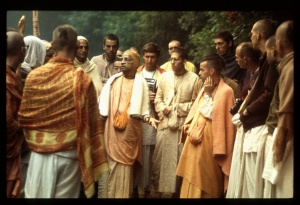SB 3.25.32

A.C. Bhaktivedanta Swami Prabhupada
TEXT 32
- śrī-bhagavān uvāca
- devānāṁ guṇa-liṅgānām
- ānuśravika-karmaṇām
- sattva evaika-manaso
- vṛttiḥ svābhāvikī tu yā
- animittā bhāgavatī
- bhaktiḥ siddher garīyasī
SYNONYMS
śrī-bhagavān uvāca — the Supreme Personality of Godhead said; devānām — of the senses or of the presiding deities of the senses; guṇa-liṅgānām — which detect sense objects; ānuśravika — according to scripture; karmaṇām — which work; sattve — unto the mind or unto the Lord; eva — only; eka-manasaḥ — of a man of undivided mind; vṛttiḥ — inclination; svābhāvikī — natural; tu — in fact; yā — which; animittā — without motive; bhāgavatī — to the Personality of Godhead; bhaktiḥ — devotional service; siddheḥ — than salvation; garīyasī — better.
TRANSLATION
Lord Kapila said: The senses are symbolic representations of the demigods, and their natural inclination is to work under the direction of the Vedic injunctions. As the senses are representatives of the demigods, so the mind is the representative of the Supreme Personality of Godhead. The mind's natural duty is to serve. When that service spirit is engaged in devotional service to the Personality of Godhead, without any motive, that is far better even than salvation.
PURPORT
Teachings of Lord Kapila, the Son of Devahūti, Text 32
The senses of the living entity are always engaged in some occupation, either in activities prescribed in the injunctions of the Vedas or in material activities. The natural inclination of the senses is to work for something, and the mind is the center of the senses. The mind is actually the leader of the senses; therefore it is called sattva. Similarly, the leader of all the demigods who are engaged in the activities of this material world—the sun-god, moon-god, Indra and others—is the Supreme Personality of Godhead.
It is stated in the Vedic literature that the demigods are different limbs of the universal body of the Supreme Personality of Godhead. Our senses are also controlled by different demigods; our senses are representations of various demigods, and the mind is the representation of the Supreme Personality of Godhead. The senses, led by the mind, act under the influence of the demigods. When the service is ultimately aimed at the Supreme Personality of Godhead, the senses are in their natural position. The Lord is called Hṛṣīkeśa, for He is actually the proprietor and ultimate master of the senses. The senses and the mind are naturally inclined to work, but when they are materially contaminated they work for some material benefit or for the service of the demigods, although actually they are meant to serve the Supreme Personality of Godhead. The senses are called hṛṣīka, and the Supreme Personality of Godhead is called Hṛṣīkeśa. Indirectly, all the senses are naturally inclined to serve the Supreme Lord. That is called bhakti.
Kapiladeva said that when the senses, without desire for material profit or other selfish motives, are engaged in the service of the Supreme Personality of Godhead, one is situated in devotional service. That spirit of service is far better than siddhi, salvation. Bhakti, the inclination to serve the Supreme Personality of Godhead, is in a transcendental position far better than mukti, or liberation. Thus bhakti is the stage after liberation. Unless one is liberated one cannot engage the senses in the service of the Lord. When the senses are engaged either in material activities of sense gratification or in the activities of the Vedic injunctions, there is some motive, but when the same senses are engaged in the service of the Lord and there is no motive, that is called animittā and is the natural inclination of the mind. The conclusion is that when the mind, without being deviated either by Vedic injunctions or by material activities, is fully engaged in Kṛṣṇa consciousness, or devotional service to the Supreme Personality of Godhead, it is far better than the most aspired—for liberation from material entanglement.